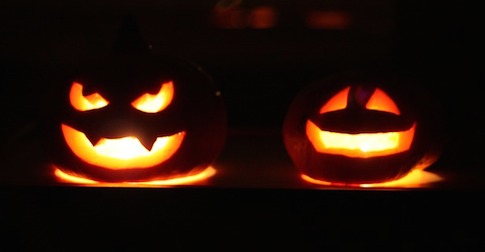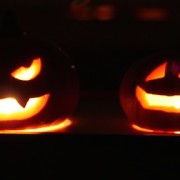Jack o’lantern
 Halloween is almost upon us and already carved pumpkins are widely on display. It’s a tradition with a long history, but not without change. In my childhood we carved spooky faces not into pumpkins but into turnips; before I first went to the USA I don’t think I’d even seen pumpkins, which are native to North America. But nowadays the more spectacular American version has taken over in the UK.
Halloween is almost upon us and already carved pumpkins are widely on display. It’s a tradition with a long history, but not without change. In my childhood we carved spooky faces not into pumpkins but into turnips; before I first went to the USA I don’t think I’d even seen pumpkins, which are native to North America. But nowadays the more spectacular American version has taken over in the UK.
Another change seems to be the decreasing use of the traditional term jack o’lantern for these objects. (The more literal terms ‘Halloween pumpkin’ or ‘carved pumpkin’ seem more common.) The o’ in jack o’lantern is pronounced with the weak, colourless little vowel schwa /ə/, giving /dʒakəˈlantən/:
The o’ comes historically from of the, as in o’clock: originally these were of the lantern and of the clock. Shakespeare’s character Falstaff says
My lord, I was born about three of the clock in the afternoon (Henry IV Part 2)
It’s not surprising that of the dwindled to /ə/ over time – we can hear the same process today as a rapid speech effect. Of the is regularly pronounced weakly, as in President /əv ðə/ United States:
The /v/ can easily be lost, producing /ə ðə/:
And in very rapid speech, the weak consonant /ð/ can be lost and the vowels merged into one:
There, as in jack o’lantern and three o’clock, the only thing between President and United States is a little schwa.
Further notes
Jack of the lantern was historically reanalyzed as an indivisible unit, giving plural jack o’lanterns (not jacks o’lantern). In last week’s post I discussed how some English speakers, including a number of non-natives, have reanalyzed point of view in the same way, giving plural point of views rather than points of view.
The of in point of view is generally /əv/ at normal tempo, /ə/ in rapid speech.

